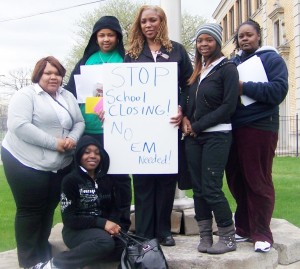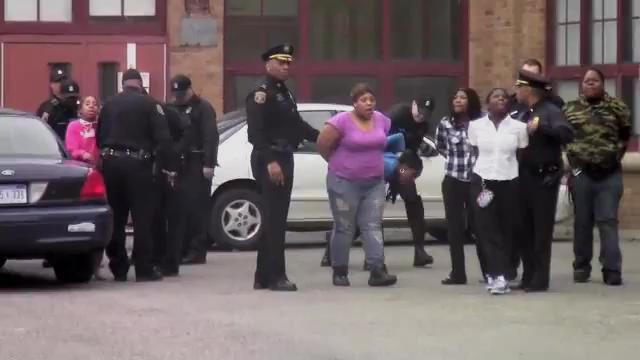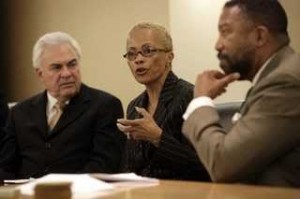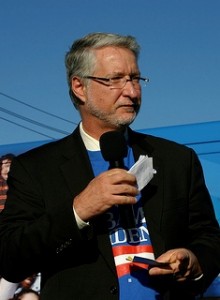
DPS teacher Christal Bonner (center) joins parents and students at Finney High Apr. 28 to protest school closings, lay-offs
Huffington Post
By Simone Landon
simone.landon@huffingtonpost.com
When districtwide layoff notices hit every one of Detroit Public Schools’ 5,466 unionized employees late last week, an American Federation of Teachers spokeswoman called the move the largest “one fell swoop” firing of teachers in union memory.
More broadly troubling to teachers and education-reform observers, however, was DPS Emergency Financial Manager Robert Bobb’s concurrent announcement that he plans to unilaterally modify the Detroit Federation of Teachers’ collective bargaining agreement, the first test of a sweeping new state law.
Public Act 4, signed by Michigan Gov. Rick Snyder (R) in March, grants the emergency managers of troubled school districts the power to “reject, modify, or terminate one or more terms and conditions of an existing collective bargaining agreement.” Under the law, Bobb could choose to abrogate the Detroit teachers’ contract entirely.
“I fully intend to use the authority that was granted under Public Act 4,” Bobb said in his Thursday statement. DPS spokesman Steve Wasko said Bobb has not yet “come to any conclusion about any specific changes to the contract,” but made the announcement because it would be “prudent” to inform teachers of possible changes to their contract.
Bobb’s legal right to abrogate the district’s contract with the union may be the nation’s most extreme example of an administrator’s power over teachers. But education experts say Public Act 4 has come to represent more than the contract between Detroit and its teachers — it’s an example of the increasingly polarized state of education reform nationwide.
Attacks on public workers’ collective bargaining rights have made headlines across the country, but perhaps nowhere has the issue been so hotly contested as when it comes to the rights of public school teachers. With school districts throughout the United States millions of dollars in debt, fights over teacher seniority are taking place alongside pushes to shift public money toward charter schools. Mayoral control, meanwhile, has pulled authority away from school boards in some districts, and lawmakers are seeking to mandate changes from statehouses and the judiciary.
THE SENIORITY FIGHT
Detroit’s layoffs are not unprecedented, but they could signal a new trend toward mass layoffs for large school districts unsure of their finances but required by state laws to notify teachers of potential dismissals. 2011 is the first year to see entire districts fired.
In 2010, tiny Central Falls, R.I., made headlines when Rhode Island’s education commissioner, Deborah Gist, announced that the entire teaching staff of the town’s high school would be laid off and asked to reapply for their jobs under new evaluation models.
But schoolwide layoffs have spread across districts, and dozens of pink slips have multiplied into thousands. Two months before Bobb’s announcement in Detroit, Providence, R.I. public schools officials said they would send a termination letter to each of the city’s 1,926 teachers. Providence Mayor Angel Taveras also slated four elementary schools for closure.
In addition to the across-the-board firings, the Providence announcement was noteworthy for its distinction between laying off and fully terminating the district’s teaching staff. Layoffs offer some rights to teachers, meaning a financial obligation that the mayor said the city and its $110 million budget deficit — including $28 million short from schools — couldn’t afford.
Termination letters, as opposed to layoffs, ended that obligation and offered the city a choice in how it rehires teachers. To lessen the sting, the district offered a buyout, hoping to shrink the workforce through attrition. Mayoral spokeswoman Melissa Withers said 52 of 160 eligible teachers had agreed to take the $5,000 early retirement incentive.
She said the city would not know how many dismissals to rescind or how many teachers would be teaching next year until the school board finished its school closure review process.
“There’s no scenario where the cuts don’t get made, the question is how many cuts get made,” Withers said.
Districts looking to save money by cutting staff cite the need for “maximum flexibility.” Taveras named “maximum flexibility” as the rationale behind his city’s teacher dismissals and Wasko used precisely the same language in Detroit.
“This gives us maximum flexibility going forward,” Wasko said. “We don’t know how many students we’re going to have this fall.” He said a number of variables — including charter school enrollment — could affect overall student population by a swing of as much 5,000 to 10,000 students in either direction. “It’s impossible to predict.”
But teachers unions consider the blanket firings a bad-faith bargaining tool aimed at weakening the unions’ power at the table.
“You can’t send everyone a layoff notice and abrogate collective bargaining and slash pay and benefits beyond concessions they’ve already given and expect people just to go on with their everyday life,” said David Hecker, president of AFT Michigan.
Some education policy analysts agree.
“Mass layoffs is a way to demoralize every teacher. It has nothing to do with school improvement,” said Diane Ravitch, educational policy analyst and former U.S. Assistant Secretary of Education.
EDUCATION REFORM AND THE LAW
Layoffs might be one strategy for superintendents and other school leaders looking to work around teacher seniority. Taking to the legislature and the courts is another.
Michigan’s Public Act 4 is the most extreme example, but lawmakers from New York to California are seeking ways to circumvent or eliminate public school teacher tenure, pushing for staffing decisions to be made based on merit rather than seniority.
Often, as in Detroit, layoffs and legal efforts work in tandem.
This year, the Los Angles Unified School District pink-slipped 4,485 teachers — about 14 percent of its teaching staff. Gayle Pollard-Terry, the district’s deputy director of communications, said that number is high, but not unusual.
“Generally thousands of layoff notices go out on March 15, and there is always a reduction in the number that are actually laid off,” Pollard-Terry said. For example, in 2010, the district sent more than 3,000 pink slips but eventually only laid off 682 teachers.
Like officials in Providence and Detroit, Pollard-Terry said the high ratio of notices to actual dismissals was necessary because of uncertainty in the district’s budget. “The layoff notices are based on the economic outlook,” she said. “There’s no way to predict what will change. In 2010-’11 layoffs were rescinded because teachers and administrators agreed to take 12 furlough days and shorten the instructional calendar by five days.”
Similar plans are in the works for the next school year, she said. A budget proposal released by the superintendent last week calls for another round of furloughs.
For now, the Los Angeles district’s teachers are still laid off and rehired based on seniority, but that could change at some or all of the city’s schools.
A May ruling from an L.A. Superior Court judge upheld a deal that eliminated seniority as a factor in deciding layoffs at several low-performing district schools. The case is pending appeal from the United Teachers of Los Angeles.
California state Sen. Bob Huff (R) is sponsoring SB 355, which would allow districts to lay off teachers based on performance evaluations.
Legislation that would end so-called “last in, first out” — or LIFO — policies for teacher layoffs is also pending in Illinois and New York, again tied to mounting budget deficits and the threat of mass layoffs.
In late February, New York City released a list of 4,675 teachers that would be laid off in a “worst case scenario.” The announcement came as the New York State Senate geared up for a vote on a bill that would end the teacher seniority system and allow the city to conduct layoffs based on merit.
On March 1, the bill passed the state Senate, 33 to 27. Yet it is not expected to fare as well in the legislature’s other chamber, the state Assembly.
DETROIT’S REFORM PLAN
Most of the districts looking to switch from a seniority to performance evaluation-based system for teachers are millions of dollars in debt. Detroit’s $320 million schools budget deficit is the extreme example.
In 2009, Robert Bobb was appointed by then-Gov. Jennifer Granholm as an emergency financial manager for Detroit Public Schools, making him one of four such officials around the state tasked with pulling underwater school districts out of debt.
Bobb won the confidence of much of the community early on by uncovering and eliminating fraud and waste. But when he turned to more drastic solutions, such as closing schools and revising teacher pay and benefits, many objected to his downsizing plans — which were accompanied by an invitation to charter schools to set up shop in-district. Students and parents launched protests against what they saw as dictatorial curriculum reforms, and the school board sued Bobb for allegedly overstepping his authority.
Not surprisingly, Bobb also has a strained relationship with the city’s teachers union. Detroit Federation of Teachers President Keith Johnson called the apparent threat to the collective bargaining agreement that Bobb issued last week “pitiful.”
“What the state did [in Public Act 4] means nothing to me,” Johnson said, citing the DFT’s current contract, which the union negotiated with Bobb in 2009. “His signature appears right next to mine on the agreement. If I’m compelled to honor that agreement, he’s compelled to honor that agreement.”
Johnson said the DFT has not been inflexible. In 2009, the union negotiated an overhaul of the teacher evaluation system, instituting peer assistance and review and collaborative decision-making.

Young mother students from Detroit's Catherine Ferguson Academy were brutalized, hauled out and arrested for a peaceful sit-in Apr. 15 to save their school, the only one of its kind in the U.S.
Those reforms point to the larger project Bobb has undertaken in the district — one that resembles Secretary of Education Arne Duncan’s plan for education reform on a national scale. In addition to seniority rights for teachers, the debate in Detroit hinges on the question of how school systems should be run.
Detroit is significant not only for the number of teachers being laid off, but also the number of schools closing. Steve Wasko, the Detroit Public Schools spokesman, said 32 schools are on the evaluation list for closure next year. Detroit is also noted for its aggressive charter school program, a major plank of the “Excellent Schools Initiative” that Bobb helped design.
(Go to http://voiceofdetroit.net/?p=6372 to read VOD story on DPS school closings and charter auctions.)
“Detroit has been the talk of the town in terms of the charter school community across the nation, and the school reform community,” Wasko said.
Some 70 charter operators interested in opening schools in Detroit met with Bobb on Thursday — the same day the teacher layoffs were announced.
AFT Michigan’s Hecker aligned the push for charters with the attack on the teachers’ contract.
There’s no question that when the charter movement started, a big piece of it was to try to avoid unionization,” Hecker said. “It isn’t just the financial piece of it,” he added, “a big part of the movement was always to try to avoid having to work with staff in a collaborative way through collective bargaining.”
The school system is currently in a 60-day “meet and confer” period mandated by the new law that requires Bobb to meet with the teachers union and other stakeholders before he can exercise the law’s authority. That period ends May 17.
Detroit Public Schools teacher Danielle Filipiak started teaching ninth-grade English at Western International High School on Detroit’s southwest side just this past November.
When she heard Bobb’s announcement of the teacher layoffs, she said it was “not a surprise,” but it was “insulting and demeaning.” While she said she remains optimistic, she noted that Detroit teachers have had little reason to hope lately.
“We’ve been in such survival mode over the past few years. You’re not thinking about the next step, you’re thinking about getting through the day, making it through the end of the year with over-sized classrooms and no supplies,” she said.
Filipiak has been in a classroom on each side of the debate between public and charter schools. Before joining DPS, she taught at University Preparatory Academy — a Detroit charter school.
Filipiak said U-Prep’s administration “always insinuated that what they did was better than the public schools. It just painted them like saviors in this dying system and they were going to save the city.” But Filipiak felt like she was “being asked to implement policies that were stripping families and teachers and kids of any sense of agency.”
“I left because of my commitment to this idea of public schools, and I did not want to be in a place where I couldn’t advocate for my kids,” she said.
Filipiak does not oppose charter schools generally, but said she’s wary of the way they’re being implemented in Detroit.
“There are many people who have a private interest — an economic interest — in having schools,” she said. Community ire toward Bobb is misplaced, she added, since “this has been in the making for a while.”
There are currently 45 pending applications for charter schools, and while Wasko said all 45 wouldn’t be able to be up and running in time for next school year, the plan is to get as many as possible open over the next two years.
Any operator wishing to open a charter school this year must already be running a school in the city. But Wasko said the district hopes to open the process to others the following year. He said Bobb had received a number of contacts from “successful national operators,” including Rocketship Education, which runs several schools in San Jose, Calif.
The charter plan has received criticism from community members and national education policy analysts as well as from area teachers.
“The idea of laying off all the teachers and privatizing as many public schools as possible seems to be part of the corporate reform agenda to transform public education into a free market entrepreneurial activity,” Ravitch said.
Filipiak said the most challenging aspect of school reform efforts is ensuring every stakeholder has a voice.
“There’s not any sense of democracy in Detroit — that’s what makes it so different,” she said. “If that was the case, reform might look very different.”
Huffington Post April 20, 2011














click here for more info
I wouldn’t consider this particular.